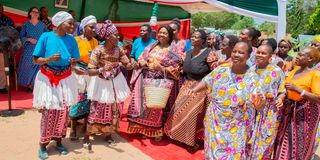Hope for African widows as continent moots empowerment fund

Second Lady Dorcas Rigathi (carrying a woven bag) joins Kilifi widows in a jig at Gede Primary School on February 27, 2024. She launched a programme that will engage Kilifi widows in mangrove restoration for their economic empowerment through carbon credit.
What you need to know:
- Widows in Africa could soon have a reason to smile after the idea of establishing a continental fund for them was mooted.
- The idea was fronted by Kenya’s Second Lady Dorcas Rigathi during the inaugural Africa Widows Summit in Zanzibar.
- The summit was themed ‘Women in Widowhood: Reforming the African Space’. It was aimed at crafting solutions to challenges.
Diana Lukosi was devastated in 2007 after she lost her husband of seven years through a road accident.
Diana could not figure out how she would cope with life now that her family’s sole breadwinner was no more.
After the funeral of her husband, things took a more dramatic turn than expected, much to her disbelief.
“I lost all his properties, including land and businesses. I also lost compensation from where he worked and the insurance company,” Diana says.
The mother of two says her tender age, coupled with lack of information on succession, led to her losing everything she was supposed to inherit from her husband.
“I did not know anything about succession. I was not aware that after the death of my husband I was supposed to lodge a succession case in court. I was only a 29-year-old housewife who knew nothing much when my husband died. Those who shortchanged me took advantage of my ignorance.”
She adds that lack of money and necessary resources to undertake succession only fuelled her woes and predicament, much to the advantage of her detractors.
Diana’s plight mirrors what millions of widows across Africa face in their day to day life as they press to inherit their late husbands’ property.
However, the widows on the continent could soon have a reason to smile after the idea of establishing a continental fund for widows was mooted.
The idea to have the African Union (AU) establish a widows’ fund was fronted by Kenya’s Second Lady Dorcas Rigathi during the inaugural Africa Widows Summit in Zanzibar.
The summit was themed ‘Women in Widowhood: Reforming the African Space’. It was aimed at crafting solutions to challenges.
Ms Rigathi urged the African Union to set up a fund to support widows on the continent. She told the conference she was brought up by a widow. She inspired more than 800 widows who attended the Summit not to give up or lose hope.
“My mother was widowed for 45 years, and I saw the struggles she underwent bringing up eight children. She was, however, not a victim of her circumstances, but engaged in businesses and we became who we are because she did not see herself as a victim. Widows need empowerment and opportunities, not sympathy.”
She called on African nations to organise widows into cooperatives, Saccos and community-based organisations to help harness their potential and take advantage of the entrepreneurial spirit of the African population.
“In Africa, we have the spirit of enterprise and women are enterprising. Let the Africa Union come with a policy where the widow is at the centre in areas of business and investment.
"Let the African Union also establish a fund where women borrow without all the bottlenecks and hindrances, and be adequately financed to engage in different types of businesses.”
Currently, Ms Rigathi has a widows programme in Nairobi, Kajiado, Migori, Laikipia, Kakamega, Bungoma, Trans Nzoia, Nandi, Bomet, Kilifi and Nakuru.
The projects include economic empowerment through fish farming, tree nursery establishment, goat keeping, beekeeping, bead-work, agribusiness, dress-making, soap and detergent making, and candle manufacturing, and psychosocial spiritual support.
The President of Zanzibar, Dr Hussein Ali Mwinyi, opened the three-day summit that was attended by more than 800 widows from Nigeria, Cameroon, Tanzania, Zanzibar, Kenya, Zimbabwe, Zambia, Uganda, and Sierra Leone.
He identified with the plight of widows, and urged nations to look more keenly into their suffering and ways of alleviating the difficulties they face.
“Widows should be legally recognized and respected, economically empowered, and availed of the necessary health interventions, and also education. It is our responsibility to ensure widows are not stigmatized, they are not looked down upon, taken advantage of or humiliated,” Mr Mwinyi said.
Former Tanzania First Lady Anne Mkapa identified with the struggles and challenges that widows go through. She lost her husband, President Benjamin Mkapa, in 2020.
“Addressing the issues affecting widows in Africa requires a multifaceted and comprehensive approach that addresses the root causes of widowhood, and empowers the widows to access their rights and resources. It may be useful if African countries were to enact and enforce laws that protect the rights of widows,” Ms Mkapa said.
She noted that such initiatives can help prevent exploitation and mistreatment and ensure widows have access to the resources they need to support themselves and their families.
Ms Mkapa added that countries should also raise awareness of the challenges faced by widows and help change cultural attitudes and practices that stigmatise and exclude them.
Other delegates at the conference included former Zanzibar First Lady Mariam Mwinyi, Zimbabwe First Lady Auxillia Mnangagwa, former Zanzibar First Lady Mama Shadia Karume, and Union of African Widows president Hope Nwakwesi.
One in 10 African women above the age of 14 is widowed, according to a 2018 World Bank report.
Most of them struggle with serious economic constraints, especially if their husbands were the sole breadwinners for their families.
Rural widows in Kenya are particularly disadvantaged by patriarchy, harmful cultural practices and poverty. There are about 258 million widows around the world, and nearly one in 10 live in extreme poverty.





